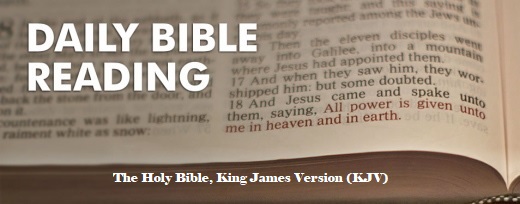The Daily Readings
SATURDAY, September 12, 2020
Psalm 114; Exodus 15:19-21; Matthew 6:7-15
The Holy Bible, King James Version (KJV)
Today's Verse-of-the-Day: Philippians 4:4
Rejoice in the Lord always: and again I say, Rejoice.The theme of joy is prominent in Philippians. The command to rejoice can always be obeyed, even in the midst of conflict, adversity, and deprivation, because joy rests not on favorable circumstances, but “in the Lord.” Paul uses repetition to emphasize this truth.
Today's Readings:
Tremble O earth
Our God is the God of all creation. He split the Red Sea and parted the Jordan River (v. 3). He made the mountains and earth shake (vv. 4, 7). He turned solid rock into springs of water (v. 8). Marking moments in Israel’s history, the psalmist focused his meditation entirely on God’s power and majesty. This is the second of six Passover prayers sung by devout Israelites.As you pray, consider how Jesus can bring a spring of living water from hardened hearts (John 4:10, 14). Ask Him to do that among your loved ones who have turned away from God. Use this psalm as a guide to praise God for His awesome power.
114:1 When Israel went out of Egypt, the house of Jacob from a people of strange language;
2 Judah was his sanctuary, and Israel his dominion.
3 The sea saw it, and fled: Jordan was driven back.
4 The mountains skipped like rams, and the little hills like lambs.
5 What ailed thee, O thou sea, that thou fleddest? thou Jordan, that thou wast driven back?
6 Ye mountains, that ye skipped like rams; and ye little hills, like lambs?
7 Tremble, thou earth, at the presence of the Lord, at the presence of the God of Jacob;
8 Which turned the rock into a standing water, the flint into a fountain of waters.
The song of Miriam
A narrative interlude separates the Song of Moses from Miriam's song in v.21. Miriam is called a "prophetess" (cf. Nu 12:2) and a "sister" of Aaron, even though she was also Moses' sister. But apparently she ranked only with Aaron and not with Moses. There would be other prophetesses in Israel (Jdg 4:4; 2Ki 22:14; Ne 6:14; et al.). As a prophetess and a leader in Israel (Mic 6:4), Miriam led the women perhaps in an antiphonal response, repeating the song at the conclusion of each part or strophe, accompanied by timbrels and dancing.15:19 For the horse of Pharaoh went in with his chariots and with his horsemen into the sea, and the Lord brought again the waters of the sea upon them; but the children of Israel went on dry land in the midst of the sea.
20 And Miriam the prophetess, the sister of Aaron, took a timbrel in her hand; and all the women went out after her with timbrels and with dances.
21 And Miriam answered them, Sing ye to the Lord, for he hath triumphed gloriously; the horse and his rider hath he thrown into the sea.
Forgiving one another
Jesus was concerned about fake religion, so He instructed His disciples not to use religious activities to look good in public (vv. 1–4). In that context, Jesus also taught them how to pray. He told them not to be like hypocrites, who prayed in public to bolster their egos (v. 5), but to go into a room alone and close the door (v. 6). Then He gave them a simple model of prayer, which we often use in public worship, that includes honoring God as our Father; praying for His coming kingdom to be established, His provision for our daily needs, and His will to be done; and asking for forgiveness and deliverance from evil (vv. 9–13). The prayer closes with acknowledgment of God as King of all (v. 13).Perhaps you can go into a room and close the door now. Pray through each line of the Lord’s Prayer. God, who sees what you do in private, will reward you (v. 6).
6:7 But when ye pray, use not vain repetitions, as the heathen do: for they think that they shall be heard for their much speaking.
8 Be not ye therefore like unto them: for your Father knoweth what things ye have need of, before ye ask him.
9 After this manner therefore pray ye: Our Father which art in heaven, Hallowed be thy name.
10 Thy kingdom come, Thy will be done in earth, as it is in heaven.
11 Give us this day our daily bread.
12 And forgive us our debts, as we forgive our debtors.
13 And lead us not into temptation, but deliver us from evil: For thine is the kingdom, and the power, and the glory, for ever. Amen.
14 For if ye forgive men their trespasses, your heavenly Father will also forgive you:
15 But if ye forgive not men their trespasses, neither will your Father forgive your trespasses.
Optional parts of the readings are set off in [square brackets.]
The Bible texts of the Old Testament, Epistle, and Gospel lessons are from The Holy Bible, King James Version (KJV).
The Daily Bible Readings are selected from the Revised Common Lectionary Daily Readings, a three-year cyclical lectionary. We are currently in Year A. Beginning with the first Sunday of Advent in 2020, we will be in Year B. The year which ended at Advent 2019 was Year C. These readings complement the Sunday and festival readings: Thursday through Saturday readings help prepare the reader for the Sunday ahead; Monday through Wednesday readings help the reader reflect and digest what they heard in worship. Revised Common Lectionary Daily Readings, copyright © 2005 Consultation on Common Texts. www.commontexts.org
The Daily Readings for SATURDAY, September 12, 2020
Psalm 114; Exodus 15:19-21; Matthew 6:7-15 (KJV)


No comments:
Post a Comment